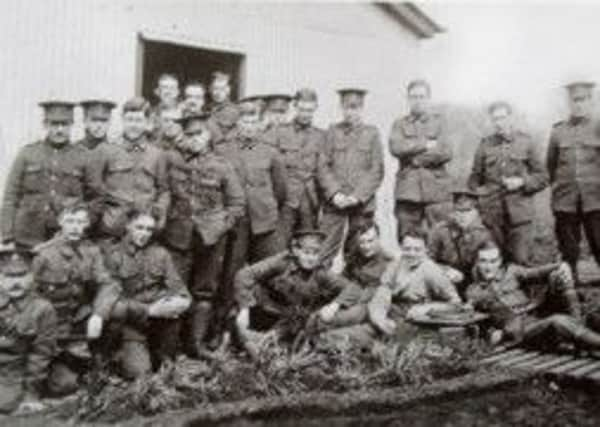Ballymena 1914-1918: Pen mightier than the sword as local soldiers hit back at Council


Councillors had berated the town’s publicans for serving some men who were already ‘well lit’ and others voiced outrage at seeing a group of soldiers with ‘drink taken’ singing songs and dancing to the music of a street entertainer with a melodeon. Wiser heads urged the complainants to bear in mind that these were, in the main, young men who had been sent to a part of the country far from their homes and who had been engaged in hard, physical training for weeks on end.
The Observer’s report of the meeting obviously infuriated the men of the 12th Rifles who were undergoing their own training, sixty miles away from Ballymena at the Newtownards Camp.
Advertisement
Hide AdAdvertisement
Hide AdThe following week’s paper contained a letter to the editor which pulled few punches and absolutely reeks of resentment and dismay:-
Dear Sir – We hope you will permit us space in your widely circulated paper to express the opinion of the majority of the soldiers in this camp, who were recently at home on leave, with regard to the discussion which took place at the meeting of the Ballymena Urban Council on Monday 7th Inst.
We have read with much interest what appears to be a verbatim report of the meeting and we regret that in this critical time, when the spirit of all should be united in one common cause that a few of what some people might consider the most intellectual members of the council should have lost such valuable time in endeavouring to arrive at a conclusion as to how to act in order to prevent a recurrence of evil should any of the soldiers again arrive to pollute the peaceful streets of your law-abiding town.
It is a great pity that the good words uttered by Rev. Dr. Patterson, the founder of the Catch-My-Pal movement, should have been so soon forgotten by some of the prominent members of this once flourishing organisation.
Advertisement
Hide AdAdvertisement
Hide AdThe Rev, gentleman said that in the event of a Pal falling, our duty was not to publish it on the house-tops but to shield him from the world, inspired with the spirit of Him who flew the banner of love.
A member, voicing the opinion of quite a number of influential gentlemen of the town, spoke of the sad sight and unseeming conduct of a ‘great many’ of the soldiers on leave. Is this his idea of patriotism?
Does this encourage recruiting? Will it encourage the respectable lads of Ballymena who are still wearing mufti to don the King’s uniform and take their stand side by side with men whose conduct was so deplorable?
Another member, who seemed most anxious that his remarks should be reported in full, directed his ‘gas’ towards the Randalstown camp. We desire to tender our best thanks to those members who defended the soldiers and did not judge them by the improper actions of one isolated case. Thanking you for publication and apologising for having taken up so much of your valuable space.
Yours sincerely, Ballymena Boys serving in the 12th R.I.R.
Advertisement
Hide AdAdvertisement
Hide AdThe ‘Catch-My-Pal’ movement mentioned above was a pre-war temperance league aimed at defeating the perceived evils of the demon drink.
Court reports of the time make regular reference to men ‘taking the pledge’ to refrain from alcohol but there were equally frequent references to those who had failed to keep their promise.
From time immemorial, soldiers have acquired a reputation as hard drinkers and there is little doubt that some men, home on leave, perhaps for the last time, enjoyed a fair few pints in their local.
The men of 1914-1918 were not lily-white angels. In the main they came from a hard-drinking, often violent society. There should be no rose-tinted glasses worn when examining this era.
Advertisement
Hide AdAdvertisement
Hide AdNevertheless, the council debate brings to mind the words of Kipling’s legendary poetic tribute to the average British soldier.
Yes, makin’ mock o’ uniforms that guard you while you sleep Is cheaper than them uniforms, an’ they’re starvation cheap; An’ hustlin’ drunken soldiers when they’re goin’ large a bit Is five times better business than paradin’ in full kit. Then it’s Tommy this, an’ Tommy that, an’ “Tommy, ‘ow’s yer soul?” But it’s “Thin red line of ‘eroes” when the drums begin to roll …
In the following year there would be little time for ‘goin’ large’ and the red line of heroes would, indeed, be drastically thinned.
After months of initial training at Clandeboye, the Ulster Division moved to Seaforde in southern England for their final sharpening prior to embarkation to France.
Advertisement
Hide AdAdvertisement
Hide AdBefore they left, the battalion received an unusual gift from a civic dignitary. The Observer reported:-
The 12th Royal Irish Rifles (Central Antrims) was recently presented by the Chief Constable of Norfolk with a regimental pet.
‘Slemish’ is a very handsome, stern looking blood-hound. Slemish mountain is the highest peak in Mid-Antrim and for many years has been a popular meeting place for picnic parties. Ballymena Observer, October 15, 1915
The new mascot was aptly named since Slemish, the ‘mountain of mists’ closely associated in legend, if not fact, with the story of Saint Patrick, would have been a familiar sight to virtually all the local lads in the battalion.